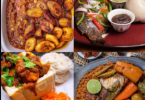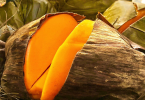Nigeria in the modern world is gradually witnessing a cultural fusion in food, fashion, world-view and family values. Join us as we embark on some common recipes you can use in making Nigerian food at home. The recipes may vary slightly from region to region, but it is still basically the same food.
One of the strong bonding forces working to bring the culturally-diverse Nigeria and its people together is Nigerian cuisine. Centuries of mutual contact and interaction (good and otherwise) between different Nigerian ethnic groups have led to a cross-exchange of food ingredients and recipes.
Nigerian Food has Transcended Borders – Not Just Tribes
There are now traditional dishes that originated in one part of the country, but gradually becoming a regular feature nationwide. Such foods have acquired a national status due to migration, travel and interaction between the different tribes.
And it will interest you to know that strong traces of Nigerian food exist as far as Latin America and Caribbean lands. This is due to the transatlantic slave trade of old. Which suggests that the diaspora demonstrate a strong connection to their roots through food.
The journey towards unity in the midst of diversity may require work. But with the vast array of flavors and ingredients that come with Nigerian food, isn’t it worth it? It should rather excite us, because it’s a tasty journey.
Without further ado – we will do a quick walk-through of famous recipes that constitute modern Nigerian food. And beyond this, we encourage you to get the detailed recipes and ingredients for these foods from trusted food blogs. We will introduce some popular ones to you in this article.
Common Nigerian Food Recipes You Need to Know
The Iconic Egusi
Egusi is melon seed – widely consumed as a soup/stew ingredient across Nigeria and even West Africa. As you move from one region to another, one would notice slight variations in the way it is prepared. Egusi can be ground (dry or wet); toasted or left raw; and mixed into thick paste or made watery. It may be cooked with or without green vegetables. Oftentimes it is combined with a variety of animal protein, herbs and spices native to each region.
Rice Dishes
Rice is a famous Nigerian staple eaten virtually everyday, everywhere and at every occasion. There are a good variety of rice dishes cooked in the country. Plain boiled rice eaten with accompaniments, for instance, is quite common. Such accompaniments could be any one of the following: fried plantains, moin-moin, fish, meat, poultry, beans, fried potatoes, or vegetable salad.
Rice is also popularly cooked and served as one-pot variety rice in various forms. These varieties include Jollof rice, Fried rice, Coconut rice, and Native rice. Each one of them is prepared with a mix of ingredients which often include vegetables, spices, seasoning and animal protein. Variety rice dishes are often the main dish at special occasions, such as weddings, birthdays, and festivities – with tasty accompaniments served with it.
There are also native varieties of unpolished rice. They are popularly called ‘Ofada‘, ‘Abakaliki‘ and other local names depending on where they are grown. Local rice has a distinct taste and aroma that is appealing. In southwest Nigeria, it is often eaten with a special stew/sauce called ‘Ayamase‘.
Fried Snacks
Across the whole of Nigeria, you will often find some popular fried foods cooked both in the home and on the streets. In fact, fried foods are quite popular in Nigeria. They consist of common snacks such as bean cakes (‘Akara’); Puff Puff and Buns (made from wheat batter), Egg rolls, Fish rolls, Masa (fermented rice/corn/wheat cakes); fried yams and potatoes. You will even find fried fish and fried meat sold on the streets and in local restaurants.
Akara is blended beans, deep-fried in small balls. The recipe is simple (onion and salt is often all it requires), but it is very tasty and nourishing. Puff Puff is deep-fried wheat batter, with yeast added as a leavening agent. It comes out soft and golden-brown. On the other hand, the same wheat batter with baking powder added as leavening agent, is used to make buns. Buns contain margarine, milk, and eggs; and can be baked or deep-fried. It comes out crisp on the outside. The same wheat batter stuffed with whole boiled egg or fish flakes is used to make either egg rolls or fish rolls.
Popular Swallow Foods
A variety of Nigerian semi-solid foods (popularly called ‘swallows’) are commonly eaten and served with rich Nigerian stews and soups. They are cooked doughs made from carbohydrate-dense foods which could be cereals, tubers or plantain.
A good example is Tuwo – made from either rice, corn, millet or Guinea corn. Tuwo is a popular staple food in northern Nigeria. Towards the south, common swallow foods are made from root tubers (yam, cocoyam, cassava, potatoes), corn, and fruits (plantain and breadfruit). They include Pounded Yam/Cocoyam/Plantain (or breadfruit), Amala (from yam), Fufu, Lafun and Eba (from cassava), and Eko/Agidi (from corn).
They are prepared, cooked and pounded or mixed in several ways without adding salt, seasoning or sweeteners. But they are served with flavorful and rich soups and stews as accompaniments.
Versatile Beans
Beans is one food grown and eaten all over Nigeria, and a favored source of proteins. It can be boiled plain; or with other ingredients (such as vegetables, crayfish and animal protein) and made into a rich stew. It is often served with Rice; Bread; Garri (cassava flakes); boiled/fried yam, cocoyam, or potato; unripe plantain; or fried plantain (Dodo). It can also be blended to make a watery soup popularly called ‘Gbegiri‘ in southeast Nigeria – often paired with Jute soup (Ewedu).
Yet again, blended beans is the major ingredient in making two famous Nigerian foods/snacks known as Akara (fried bean cakes) and Moin-Moin (steamed bean pudding).
The Nigerian Food Family: Other Famous Members
Have you ever tried the savory fried plantain and eggs? Or roasted plantain served with fried/smoked fish or groundnuts? They are so yummy and satisfying; and quite easy to prepare.
There are also various tasty, aromatic and spiced-up soups and stews cooked with a variety of vegetables and ingredients all over Nigeria. Edikang-ikong, Fisherman’s soup, Pepper soup, Spinach soup, Groundnut soup, Palm kernel soup, Baobab soup, and variety Okra soup. These are just a few tasty soups and stews that constitute Nigerian food. In fact, it is popular belief (backed with scientific fact) that these soups and stews are the real food. They are packed with so much nutrition.
Common Nigerian Drinks
In Nigeria, drinks are as valued as the meals they accompany. They are highly treasured accompaniments to party food. You will find local drinks such as Zobo (Sorrel/Hibiscus tea), Soya milk, Tigernut milk, Palm wine, Fura (made from cow milk and millet) and Kunu (a mix of cereal and tigernuts).
Nigerians also indulge in malt drinks, imported wines, soft drinks, fruit juices, beers and spirits. Alcohol is typically shunned amongst Muslims, especially in northern Nigeria.
Recommended Food Blogs for Nigerian Food
You can get comprehensive recipes for many of the Nigerian foods mentioned above, by clicking the links below:
.








